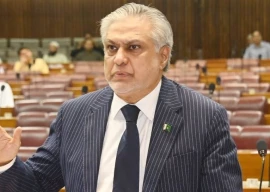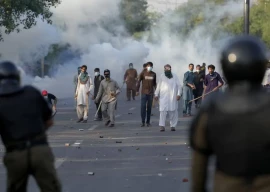
His daughter, Salma Mahmud has just published her memoir The Wings of Time (Har-Anand Publications New Delhi, 2012) recalling her days with this extraordinary man. MD Taseer was brought up by the distinguished Barudkhana family of Lahore. She tells us: “Barudkhana Haveli, situated inside Bhati Gate, was the largest arsenal in Lahore after the one in the nearby Lahore Fort. It belonged to Maharaja Ranjit Singh.... After his death the British government acquired it and finally it was purchased from them by Mian Karim Buksh, father of Mian Nizamuddin”. The last named adopted an orphaned three-year-old named Muhammad Din.
The book has a list of great people who consorted with Taseer as vagrant boys when the inner city streets were their domain; and later, when Taseer was Lahore’s gilded youth. The earliest companions were Dr Nazir Ahmad — because he lived across the street — Ghulam Abbas and Badruddin Badr. Then, at Majeed Malik’s home, off Fleming Road, there were AS ‘Patras’ Bokhari, Hafeez Jalandhari and Abdul Rehman Chughtai enjoying “convivial evenings” with him.
After his PhD from Cambridge at the end of 1935, Taseer returned to India, took up teaching and went as principal of a college in Amritsar where Faiz Ahmad Faiz was to be a shy, withdrawing lecturer. Taseer was married to an Englishwoman with a wonderful medieval name, Christabel. Salma traces her mother’s lineage back to a French Huguenot refugee family savaged by Christian fanatics as Cathar deviationists.
Her sister Alys, while on an extended visit to Amritsar, married Faiz, thus linking Salma to two great poets of Urdu literature: Allama Iqbal, who married into the Barudkhana clan, wrote a radical nikah nama for the Taseer-Chris wedding.
About this wedding, Salma reveals: “Allama Iqbal, who had advised Daddy to choose a European wife, as he would never be happy with an Indian spouse, was very pleased with Daddy’s decision” (p.81). The advice was based on bitter experience. Atiya Fyzee in her memoir wrote movingly of the tragedy of Iqbal’s own difficult process of reconciliation with an Indian marriage.
Professor Hameed Ahmed Khan, from the family of celebrated orator-journalist Zafar Ali Khan, greatly admired Taseer and once described him thus: “As a small boy he recalled seeing my father with his red fez set askew over his ears, his mischievous glances, his confident demeanour, hands thrust challengingly into his coat pockets, ready to take on the world. Perhaps this liveliness was his reaction to being existentially alone in the world” (p.42).
(In 1960, this writer, while sitting in class 12 at Government College Lahore, saw Salmaan Taseer walk in to attend an economics lecture of Shoaib Hashmi, along with Tariq Ali, Shahid Rahman and Salman Peerzada. MD Taseer had died in 1953; and ‘orphan’ Salmaan in 1960 precisely matched the above description of his father.)
In Lahore, Taseer was to change his view of the Progressive Writers Movement, which he had helped found in the 1930s. He left it because of its totalitarian constriction. He found solace in the individualism of Lahore’s Renaissance-like ambience. His companions included: Hafeez Jalandhari, NM Rashid, AD Azhar, Hamid Ali Khan, Dr Aftab Ahmed, Sufi Tabassum, Professor Sirajuddin, Majeed Malik, Sufi Tabassum, and Faiz.
He embraced Pakistan before it became mentally closed on ideology. Today, he would have agreed with the stand his son took against Pakistan’s shame: the Blasphemy Law.
Published in The Express Tribune, February 5th, 2012.
COMMENTS (19)
Comments are moderated and generally will be posted if they are on-topic and not abusive.
For more information, please see our Comments FAQ













































I doubt if you can find a columnist of Khaled Ahmed's calibre.
@Abid P. Khan
Thanks for the links. The more I know about him the more I am convinced he somehow believed in the supremacy of the white (at least of the British) race.
@ Abid
The coronation took place in 1911 he received the knighthood 1923. according to your brilliant theory the british monarchy decided to give him knighthood after 11 years and during all those years they only had these two poems on the basis of which they gave him knighthood, the thirteen books and many essays which made him one of the most renowned poet of his era was just trivial matter.
@Tsunamilota:-Only three shames?,I appreciate your benevolence towards the prevailing state of mindset of people at large.By this comment I dont mean you may start counting as you will not find the other end of the rope of shame ,if it means anything!?
@wasim:
Iqbal was given the knighthood for his extra ordinary literary services, it wasn’t that hard to figure you could have done it yourself.
You are right. Stupid me. Should have realised, for whom was he performing extra ordinary literary services .
In December 1911, on the occasion of the coronation of King George V, Iqbal wrote and read out a poem entitled ‘Our King’:
“It is the height of our good fortune, That our King is crowned today. “By his life our peoples have honour, By his name our respect is established. “With him have the Indians made a bond of loyalty, On the dust of his footsteps are our hearts sacrificed.” (ibid., p. 206.) .
A little search will augment your repertoire of his panegyrics, even for HM Queen Victoria, (farmaN rawaaey hiNd).
@Deb:
I always had this suspicion that Iqbal had a ‘firang complex’ (white supremacy) Hopefully, someone can write a blog elaborating the mechanism that raises icons to the level of sacrosanct.
Faiz Ahmed Faiz was awarded an Honorary Colonel's rank by the British for propagating their war effort on AIR against Germans.
Iskander Mirza was the highest paid civil servant in the Raj era, was awarded the Honorary Rank of Major General.
What services did Iqbal render the British for earning his knighthood?
This is not aimed at sidetracking the discourse.
@Author I have said it before and will say it again, 'Keep enlightning
“Allama Iqbal, who had advised Daddy to choose a European wife, as he would never be happy with an Indian spouse, was very pleased with Daddy’s decision” (p.81). The advice was based on bitter experience. Atiya Fyzee in her memoir wrote movingly of the tragedy of Iqbal’s own difficult process of reconciliation with an Indian marriage.
I know it's slightly out of context to the the main thurst of this article,but can't help wondering why Iqbal opined that he (Taseer) wouldn't be happy with an Indian (granted it was pre partition period) spouse? Even if, for arguement's sake, we assume he held that opinion in the light of knowing Taseer's persona and it was specific and not general, question remains that Iqbal didn't consider even a single Indian woman fit to be Taseer's spouse. Was he right in opining that an european wife would be better than an indian one, per say based on his unique personal experience? I always had this suspicion that Iqbal had a 'firang complex' (white supremacy) and this piece of information adds to it.
Wonderful article! And a very nice history lesson.
Thanks for sharing all this ........... it could be our saving grace
'Salma traces her mother’s lineage back to a French Huguenot refugee family savaged by Christian fanatics as Cathar deviationists.'emphasized text
Nice article, just an aside thought the Huguenots were French Protestants massacred by French Catholics.
So, they weren't really seen as 'Cathar deviationists', the Cathars being a pre-Protestant sect deigned as heretics by the Pope and subject to, what I think, was the only Crusade to take place in Europe.
The slaughter of the Huguenots was just part of the ongoing joys of Catholic/Protestant secterian violence that plagued the West for centuries.
PS Christabel is a wonderful name :)
It is very heartening to see some people in Pakistan talking openly about "Pakistan’s shame: the Blasphemy Law." There is a lot more that is similar. Pakistan will do a big favor to itself if it can now squarely face the truth; for its own sake.
Great article, Ahmedjee. But please, keep in mind that Pakistan has 3 major shames: Blasphemy Law, Frontier Crimes Regulation and Balochistan.
I have known Din Mohd Taseer by his poetry and second hand knowledge of him being a great teacher. Thanks for giving a refresher course about a great family and its titanic traditions.
As usual a charmingly spun tale of a tale, which makes Khaled the master of sweet prose, and introduces so many facets of life from politics, to the linguistic; thus one looks forward to his articles. I first discovered him years a go, and never looked back. Grow in wisdom and prosper with health.
Thanks. Now I understand why Mr. Taseer stood on his principle.
If only the other political leaders know how a principle is worth fighting for, come what may....
Interesting and informative piece of work. Enjoyed reading it!
Khaled Ahmed is perhaps our last link with the vintage Lahore of bygone days.